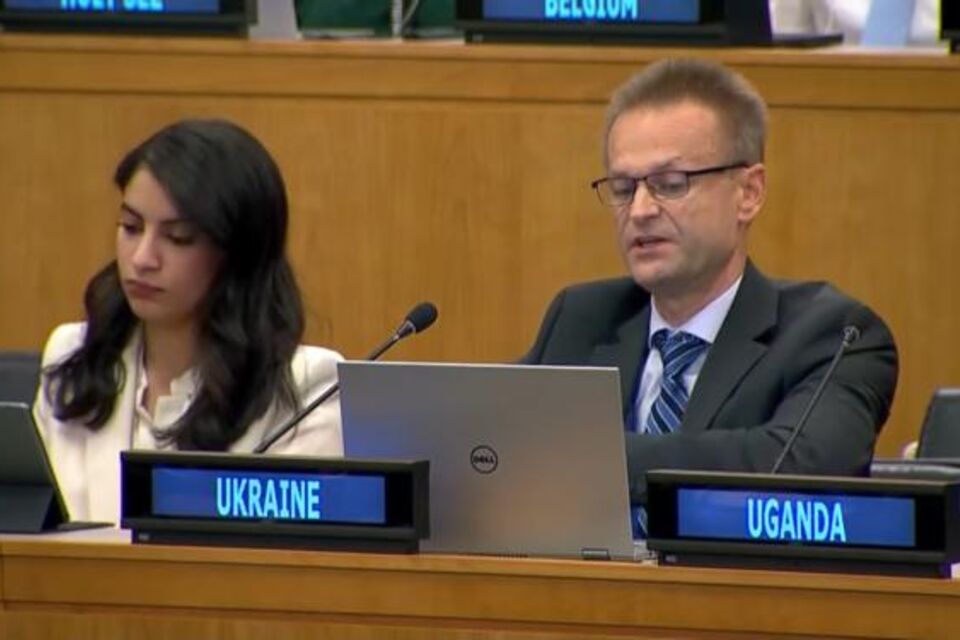Statement by the delegation of Ukraine under agenda item 18. Sustainable Development of the UNGA Second Committee

This morning the Russian Federation started massive missile strikes across Ukraine. Cruise missiles and ‘kamikaze’ drones launched from Russia and Belarus have targeted residential areas, power stations, railways, trade centers and bridges in Kyiv, Odesa, Dnipro, Kharkiv, Rivne, Lviv, Ivano-Frankivsk and other cities.
Following the morning attacks on Kyiv alone, at least 8 people have been killed and 24 injured. The overall death toll is rising as rescuers dig into the debris of destroyed infrastructure. Russia launched its terror campaign during the morning rush hour when people were coming to work and children were going to school.
Russia’s aim was to cause the utmost death and destruction among civilians. Deliberate targeting of critical civilian infrastructure is a war crime.
Russia is striking power stations, which have no military purpose, to deprive the civilian population of its basic needs – heat, electricity and water – amid the onset of cold temperatures.
Put all together, actions aimed at Ukrainians by Russia since 24 February and today’s attack amount to genocide. Putin’s terror is directed not only against the people of Ukraine. It targets the fundamental principles of humanity, the right to live in peace, dignity and security. Russia’s deliberate attacks on civilians in Ukraine and destruction of critical civilian infrastructure must be condemned resolutely.
Madam Chair,
The adoption of the 2030 Agenda for Sustainable Development in 2015 marked a substantial shift in both national sustainable development policies and international cooperation.
The concept of Sustainable Development Goals continues to promote fundamental transformations on social, economic and political tracks at national, regional and global levels. Ukraine continues to be committed to the implementation of 17 SDGs and 169 targets adopted by the United Nations General Assembly in September 2015.
Before launching the war against my country in February 2022, Ukraine was among the leaders in its region in terms of adaptation of the SDGs.
We generally achieved the progress toward 14 of 17 Goals, in particular in the area of poverty reduction (SDG1), educational reform (SDG4), renewable energy (SDG7), decentralization reform within the framework of sustainable urban and community development (SDG11). As a kind of intermediate result on this path, Ukraine presented its first voluntary national review at the 2020 High-level Political Forum.
However, the ongoing full-scale unprovoked and unjustified war waged by Russia against Ukraine has seriously undermined progress on almost all SDGs.
As an example, let me draw your attention to the great challenges in the implementation of SDG15 on ecosystems, forests, desertification, land degradation and biodiversity. The environmental damage inflicted by the Russian Federation on Ukraine since 24 February 2022 has reached a colossal scale: dozens of oil depots with tens of thousands of tons of oil products blown up by missiles of the Russian Federation, damage to oil, gas, and ammonia pipelines, targeted strikes on storage sites of other dangerous substances, which leads to significant pollution of surface waters, soils, atmospheric air, pollution of the water areas of the Black and Azov seas.
Already today, the consequences of such direct and indirect influence are felt by the countries neighbouring Ukraine: Poland, Slovakia, Romania, and Bulgaria, on whose territory the products of the combustion of dangerous substances fall. The water areas of the Black Sea and the Sea of Azov are polluted due to the spill of oil products and other dangerous substances, which negatively affects the ecosystems of both seas. Attacks and dangerous actions by the Russian Federation around Ukrainian nuclear power plants continue to create the risk of an environmental disaster.
Let me remind you that the Russian troops captured the Zaporizhzhia nuclear power plant, the largest in Europe, and are using it as a military base. The situation around the ZNPP remains critical due to constant shelling by Russian troops of the territory of the nuclear facility, illegal interference by outsiders, such as representatives of the Russian company Rosatom, in the technological process, and other illegal actions.
The ongoing hostilities and damage, caused by missiles and bombs in forests in Chernihiv, Sumy, Kharkiv, Luhansk, Donetsk and Kherson regions of Ukraine pose a serious threat to the biodiversity of Ukraine. As a result of fires caused by Russian attacks, vast territories of forests were damaged.
The timely elimination of forest fires is complicated by hostilities and mines. This also applies to grain fields deliberately set on fire by the occupying forces, in particular in the southern regions of Ukraine. The Ukrainian government continues to record numerous crimes of Russia on our territory against the environment of Ukraine.
Madam Chair,
By waging war against Ukraine, Russia has created an existential threat to the world and brought unprecedented and long-lasting challenges to the environment and human habitat. The international community must consolidate its efforts to exert pressure on Russia to put an end to this brutal and unjustified war. This would essentially contribute to stabilizing the situation in the world, make the world safer and bring us closer to achieving the Sustainable Development Goals.
Thank you.
